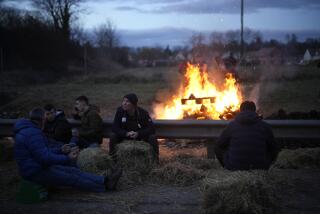How Bad Is It for Paris Cafes? They’ve Even Tried Smiling : Restaurants: Owners are desperate, as sidewalk dining in the French capital comes under pressure from high taxes and fast-food competition.
- Share via
PARIS — The French cafe, the soul of the sidewalk for more than three centuries, is fighting for survival in a society no longer willing to sit and watch the world go by.
*
Several hundred cafe owners demonstrated beneath the Eiffel Tower this week to protest the high taxes that they say are driving them out of business.
But that’s just part of the problem. Industry insiders say 4,000 bistros a year are going bust because more French are eating fast food, shunning cigarettes and booze, and simply staying home, American couch potato-style.
Desperate cafe owners trying to put a friendly face on sometimes gruff service have even taken the extraordinary step of sending waiters to smile school.
Yet, cafes keep disappearing from the French landscape almost as quickly as the steaming espresso they serve in thimble-size cups.
“When the last cafe closes, it’s the soul of the village that dies,” said Christian Couderc, owner of a suburban Paris cafe.
Intellectuals and workers alike have long gathered around small bistro tables to socialize with neighbors or exchange news and ideas, making cafes the quintessential symbol of French society and culture. Before World War I, cafes numbered more than half a million.
But by 1980, there were just 80,000; and today there are fewer than 50,000 left, including 10,000 in Paris. In 1994, more than 1,500 cafes closed in Paris alone.
The wave of terrorist bombings that have killed seven people and wounded 160 since midsummer hasn’t helped: Nearly 70% of cafes say business is down since the bombings began.
President Jacques Chirac made things worse, critics contend, when he raised sales taxes across the board last summer to 20.6% from an already stiff 18.6%. Food and drink prices were driven up even higher. In some Paris cafes, a beer can cost up to $8.
“You think we want to charge these prices?” said Bruno Mangel, a Paris cafe owner among those demonstrating Monday. “The tourists come here and can’t believe it.”
*
French cafes trace their beginnings to 1672, when the Procope--still doing a lively business--opened on a small side street on the Left Bank of Paris.
In the first half of this century, Ernest Hemingway, Jean-Paul Sartre and other literary luminaries romanticized the cafe as a social center, a debating club and a haven from the pressures of modern life.
The cafes that remain are far from empty. Ten million French say they visit one at least once a week, and plenty of foreign tourists seek them out for coffee and a croissant or a simple meal of steak or roast chicken with potatoes.
Yet nearly one in two French never sets foot in a cafe, according to a 1994 survey commissioned by the Perrier mineral water company.
“I can’t stand them. Who wants to sit around and breathe all that smoke?” said Veronique Levert, a Parisian who says she’d rather work out than hang out.
*
Cafe owners are agonizing over where they went wrong--but it’s not entirely their fault.
Independent street vendors sell cheap sandwiches from carts, undercutting cafes by appealing to business people who want to lunch, not linger. And McDonald’s, Burger King and their French counterpart, Quick, seem omnipresent both in the French capital and smaller towns.
“I’ve owned this place since 1966. But I’m 61 and retiring, and a McDonald’s is going to move right in behind me,” grumbled Joseph Gineston, who owns a cafe in the Belleville neighborhood of Paris.
Industry experts also blame the cafe decline on the rise in France of the American-style “cocooning” trend toward staying at home and watching television. To buck the trend, cafes have begun to unite behind a “quality charter” pledging a warmer welcome, fresher food and more carefully itemized table checks. The charter was conceived two years ago by fidgety French brewers, who sell 40% of their beer in cafes.
There’s also a “Celebrating Bistros” campaign to spice up more cafes with live jazz, rock and comedy. Its slogan is “Smile Included,” an attempt to win back ex-customers turned off by a grumpy garcon .
But the movement is small. So far, fewer than 3,000 cafes have signed on.
More to Read
Sign up for Essential California
The most important California stories and recommendations in your inbox every morning.
You may occasionally receive promotional content from the Los Angeles Times.










